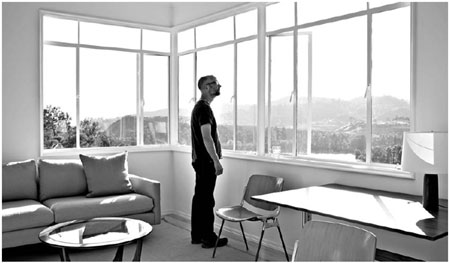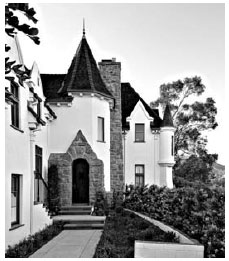A castle for America's 'King of Techno'
 |
|
Moby, the techno music artist, takes in an expansive view from his home in the Hollywood Hills area in California. Photographs by Trevor Tondro for The New York Times |

Not so long ago, Moby, a musician and composer Billboard once named "The King of Techno," was the hippest of downtown New York guys, running a teahouse/vegetarian cafe on his Lower East Side home turf, where he sometimes stopped in to wait tables, headlining at the Bowery Ballroom and going on about soy milk (well, he still talks about soy milk).
But now, while he keeps an apartment in Little Italy, he has moved to Los Angeles, to a castle on just over 2 hectares with a stone wall, a Disney-esque gatehouse and a kidney-shaped pool.
For an alternative-music guy, Moby, 45, has been doing very well. He has sold 5 million albums and 2 million digital tracks, according to Nielsen SoundScan (his music has been used extensively in soundtracks and commercials), and he has a new album, "Destroyed," out in May.
Written while he was touring, "Destroyed" is "broken-down electronic music for empty cities at 2 a.m.," he says, and indeed the music has an echoing, futuristic loneliness.
Moby decided to move to Los Angeles for a number of reasons: New York is so expensive that many of his interesting, creative friends have had to leave; the winters; and that more difficult thing from which to remove oneself, the winter of the soul. The techno musician turns out to have a more debauched past than his persona suggests.
"I stopped drinking a few years ago, and I got to say that the cold and nastiness of New York in February was a lot easier to handle when I was a crazy drunk," he says. "If you're hung over when it's sleeting outside and 40 degrees, it doesn't seem so bad."
A descendant of Herman Melville whose real name is Richard Melville-Hall, Moby was born in Harlem, when his father was a graduate student at Columbia University.
Moby and his mother moved into her prosperous family's Connecticut home when his father, whom she was divorcing, died driving drunk.
His mother, who died of lung cancer 13 years ago, was a secretary and devoted hippie. In 1969, she took him to live in San Francisco.
A few years later Moby and his mother moved back to Connecticut, living sometimes with her parents in their "perfect suburban" center hall colonial house, and at other times on their own, in grungier, darker places. "We were dirt-poor white trash in arguably the wealthiest white town in the country," Moby says. "I was on food stamps until I was 18 and became an adult.''
He became interested in music in high school, when he started going to clubs in New York. At 19, after forming his own band and working as a D.J. at a club, he moved into his own place, in an abandoned factory.
In 1986, he moved to Lower Manhattan, where he lived in a series of colorful dumps. As the money started rolling in, he started buying extravagant properties. In 2005, he bought four floors of an Upper West Side building for $4.5 million, but got "really lonely" and sold the apartment, moving back downtown.
"For a good 15 years in New York, I was sort of tragically notorious for always being the last person to leave the bar," he said.
Last year, looking at houses in the Hollywood Hills, he saw "this crazy shining castle." The price had dropped 50 percent. He went to see it and, as he says, fell in love. The castle needed major work, so Moby hired contractors to redo the roof, the kitchen, the plumbing and the wiring, replace the windows and add three bathrooms.
It's odd that someone who finds beauty in these stark places lives in what seems like the opposite, a fairy tale castle.
"It's also, in large part, the opposite of the houses I lived in growing up, which were very small and dark," he says.
"Basically, a Freudian in their first three days of school would be able to figure out the psychological impetus, which is creating or moving into the idea that I dreamed of when I was a poor kid."


















